Worried About Defending Yourself Or Home? Check Out These Great 9mm Pistols
Worth a look.
So for the purposes of this analysis, since we’re not including FMJs, the higher muzzle energy a bullet has, the better it will be as a self defense option.
Among the bullets we analyzed, the one with the highest energy is the Bufallo Bore +P+ JHP. It’s among the heavier bullets but it has a 1,300 feet per second velocity, only 1 grain and 50fps short of typical entry level .357 magnum loads.
In second place comes Underwood 9mm Xtreme Defender +P+, and Corbon PowRbal +P comes in at third.
TERMINAL PERFORMANCE
The graph below gives an idea how each of the bullets dump their energy in a soft target.
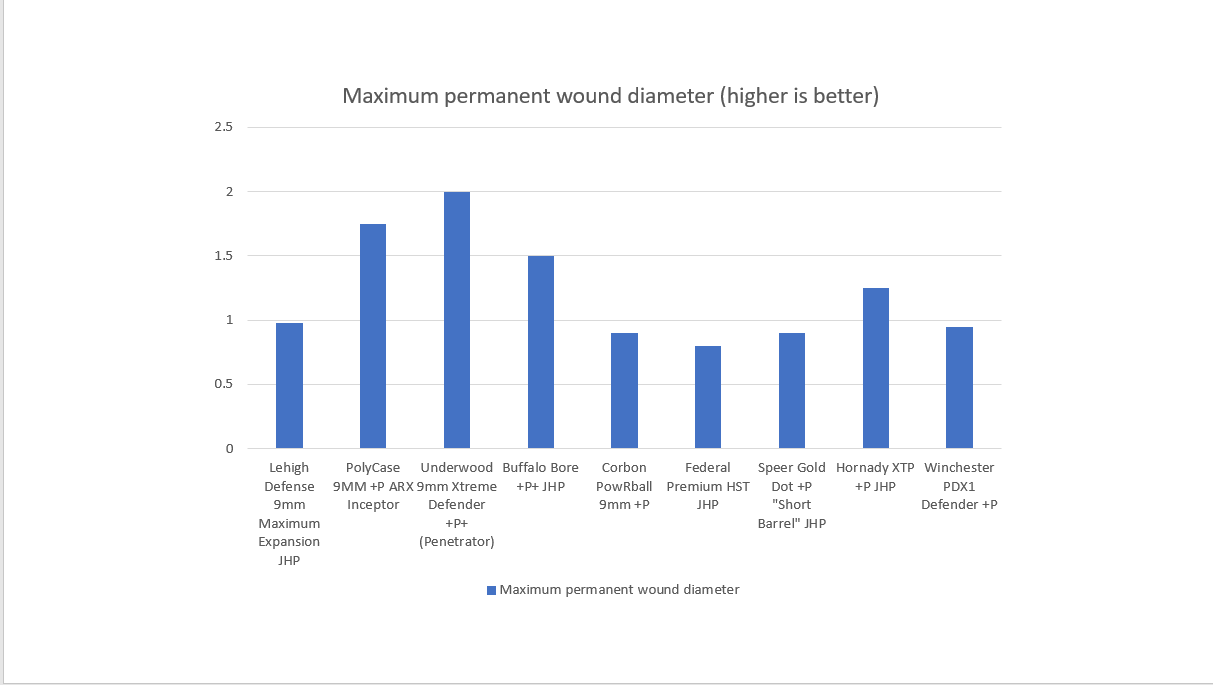
These results are in no way scientific because the type and measurement of wound cavities can be highly variable depending on a few factors such as the target’s stature and clothing, not to mention these results were taken by firing each bullet from a 4-inch barrel at a soft medium (10% ballistic gelatin – as dense as human flesh but behaves and reacts differently when hit by a speeding bullet) without accounting for bone hits and measuring only the widest visible disruption caused by the bullet (in inches).
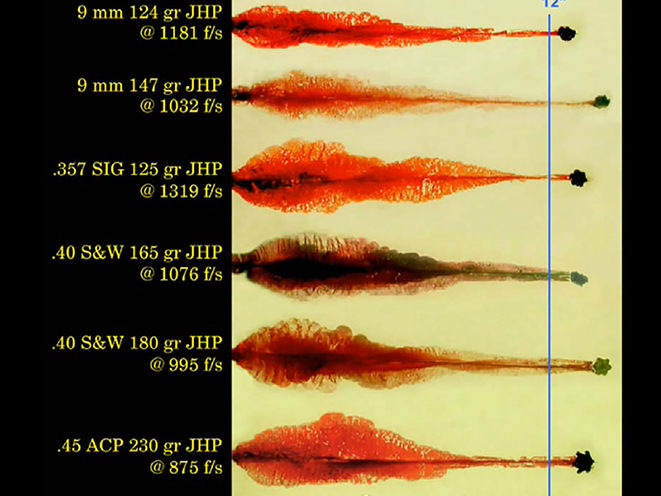
So as a disclaimer, take these results with a grain of salt. In a gunfight, it’s not the guy who uses the super awesome bullet design that wins, but the guy who can place well-aimed shots at the right time.
Still, these results are a good indicator of how well a bullet would dump its energy in human tissue. Assuming you do your job, the bullet that will give you the best chances of incapacitating your bad guy quickly is Underwood’s Xtreme Defender +P+. The PolyCase ARX Inceptor +P comes in as a close second, and the Buffalo Bore JHP +P+ comes in third.
SOFT TISSUE PENETRATION
As we briefly touched upon, the FBI adheres to a specific standard for handgun bullet penetration.
A bullet has to penetrate at least 12 inches minimum and only up to 18 inches maximum when fired in 10% ballistic gel. The 12-inch minimum is required to make sure that it will penetrate deep enough to cause damage, while the 18-inch maximum is required so that it will not overpenetrate to the point that innocent bystanders might get hit.
The chart below shows the bullets’ minimum and maximum depth of penetration measured in inches:
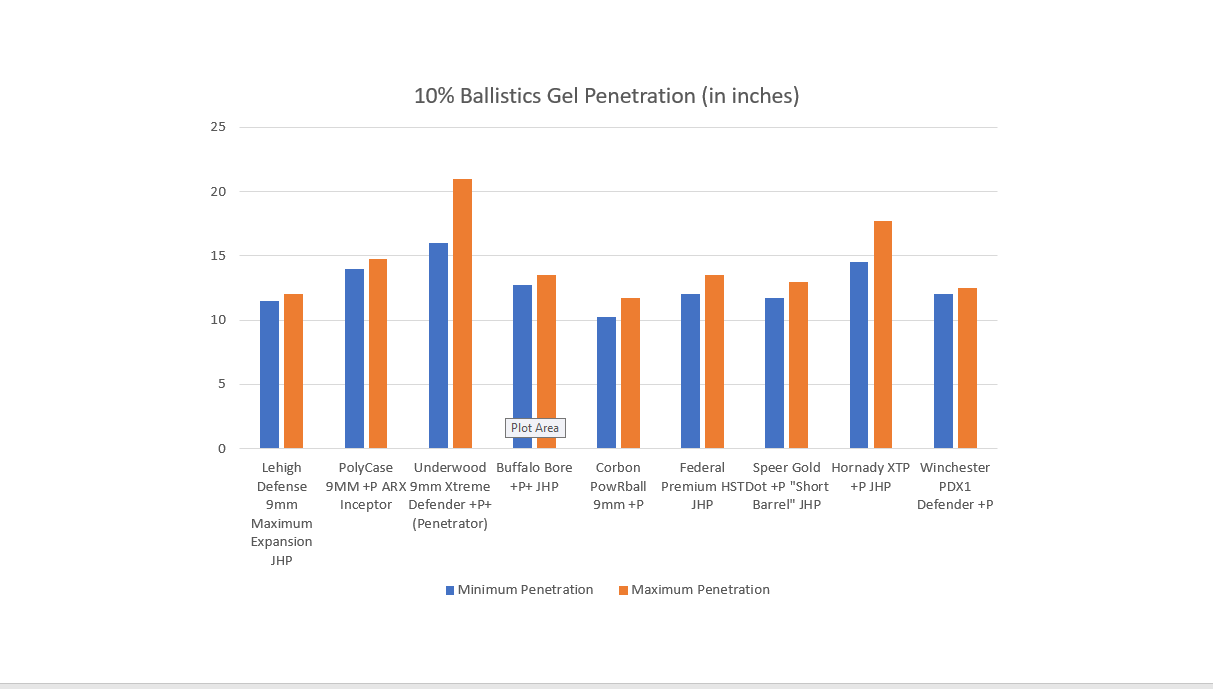
The blue bars represent the minimum depth (measured in inches) of ballistic gel material each bullet penetrated, while the orange bar represents each bullet’s maximum penetration depth.
Unlike the previous chart listing the somewhat variable terminal performance of each bullet (i.e. wounding capability), these penetration tests can be repeated by simply shooting each bullet in 10% bare ballistic gelatin. It is therefore scientific and reliable.
When shopping for 9mm ammo that will penetrate enough to only cause damage in the bad guy and not cause any collateral damage, we think the Hornady XTP +P comes out on top, the PolyCase ARX Inceptor +P again comes as a close second, and the Buffalo Bore +P+ JHP again comes as a close third.
Unfortunately we’ll have to weed out the only over-penetrating contender when considering this metric (i.e. if you’re sure you won’t have to shoot a bad guy through a solid barrier) — Underwood’s Xtreme Defender +P+. In several tests it has been shown to always penetrate a couple of inches over the FBI’s 18-inch penetration limit.
And this means we’ll have to remove the under-penetrating bullets as well. Lehigh Defense Maximum Expansion JHP, Speer Gold Dot +P “Short Barrel” and Corbon PowRball +P all have to be taken out of the list.
PRICE
Of course, what’s the point in crunching all these numbers and determining that brand X is better than all the other brands when you don’t have enough moolah to buy it? All this Mathcraft is useless if your handgun’s mag is empty, yes? The chart below shows how the different offerings stack against each other so we know which ones are wallet-friendly.

As can be quickly surmised from the chart, Hornady XTP +P is THE most affordable brand, while Corbon PowRball +P comes as a distant second and Winchester PDX1 Defender +P comes as an even more distant third.
SO WHICH ONE SHOULD YOU PICK?
Yeah, it gets confusing when you have to factor in a bullet’s ballistic and terminal performance, its effectiveness to penetrate just enough to disembowel a bad guy, and its price.
So, to make the comparison as fair to all contenders as possible, each bullet will be ranked from 1 to 9 depending on each of the metrics used, and all scores will be added up and divided by the number of metrics used.
The table below shows how each bullet was ranked in the different metrics we used:
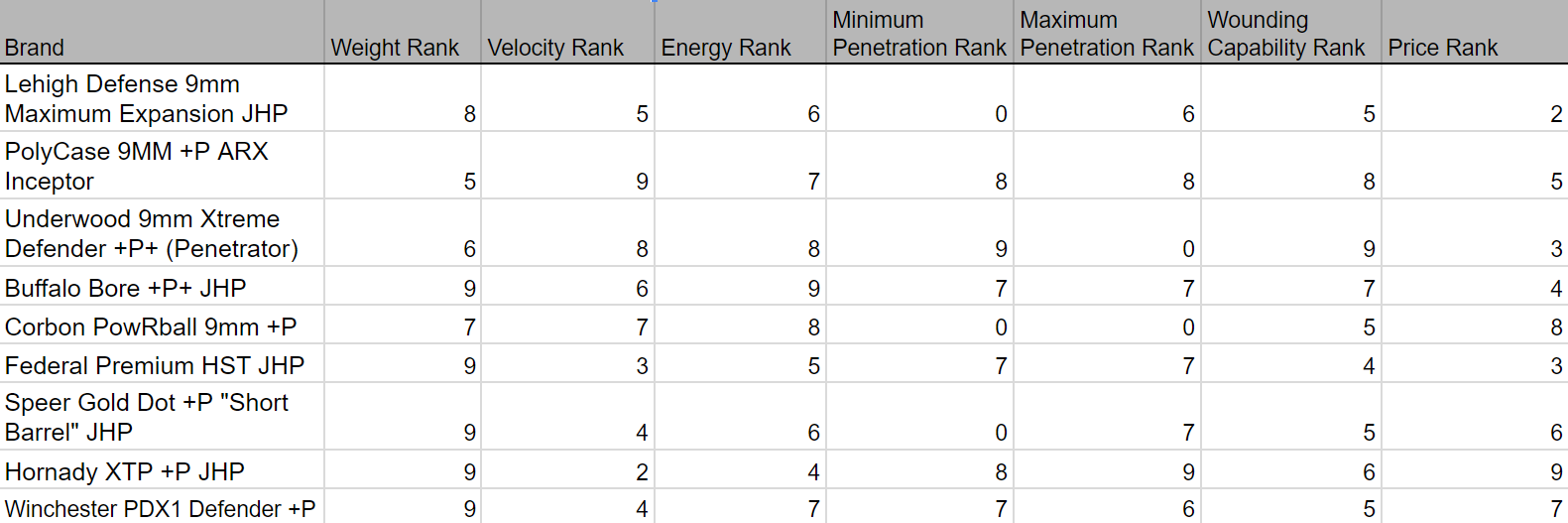
And here are the results:
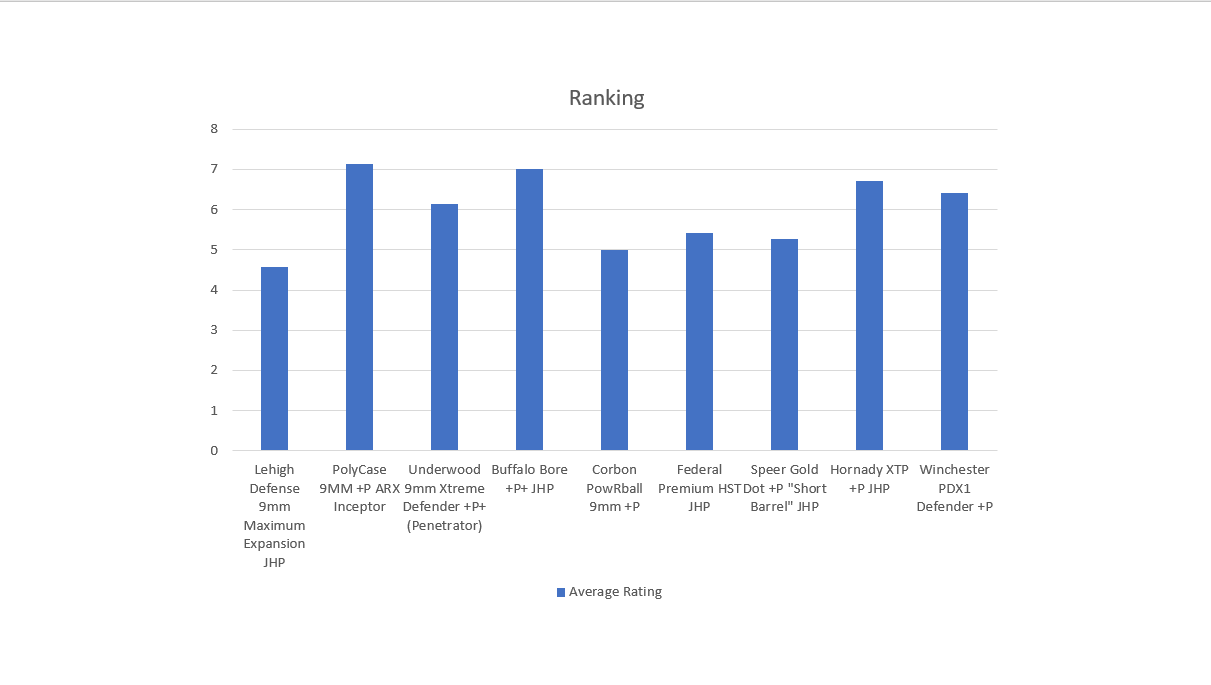
As far as I’m concerned, PolyCase ARX Inceptor +P, Buffalo Bore JHP +P+ and Hornady XTP JHP +P are tied for first place. Each bullet is designed differently — Polycase uses a more recent fluted design while Buffalo Bore and Hornady use classic jacketed hollow points.
Of these three, I would choose the Buffalo Bore JHP +P+ simply because I just love Buffalo Bore. While they’re involved in a personal injury case with Glock and Cabela’s right now, I’ve always had a soft spot in my heart for their loads.
A small ammunition company (which makes them an underdog) known for offering some of the hottest factory loads on the market, Buffalo Bore has been around for a while (can’t find anything on them thru Google, the first time I heard about them was in 2008 when I read an article about the .460 Rowland) but I believe they were founded by Tim Sundles — a hunter who has a passion for super hot handloads. Like most simple folk, I like rooting for the underdog, and being the gun nut that I am, I just love hot loads.
I’m not too sure about PolyCase. Their bullets have been shown in several tests to penetrate like an FMJ and wound like a JHP and those are made of polymer (blended with copper). I personally don’t care too much for things made of polymer, whether it’s handguns or bullets, but that’s just me. Then again Glock wouldn’t be the successful company they are now if all handgunners think the same way I do.
If you want to try them out, no one’s stopping you. Feel free to share your experience with us by leaving a comment below.
The real star of the show is Hornady‘s XTP +P JHP. It ticks all the boxes and is the cheapest of the bunch at just 59¢ a pop. Everyone in the U.S. likes Hornady, I have yet to hear anyone complaining about their products. And these XTP bullets are literally everywhere, availability will never be an issue.
I would not dismiss all the other products here though. Underwood’s Xtreme Defender +P+ does overpenetrate but I wouldn’t hesitate to carry these super hot loads in an all-steel 9mm EDC piece, simply because we never know when we might need to shoot a bad guy hiding behind some sort of solid barrier. As some Jewish writer I know once said, “Better to have, and not need, than to need, and not have.”
Federal HSTs, Speer Gold Dots and Corbon PowRballs are some of the more established premium brands. I wouldn’t feel undergunned carrying any of these loads if they’re the only ones available thru my favorite gun dealer. My only real issue with these is being premium brands, they can be a bit too pricey.
ANOTHER OBSCURE 9MM HOT LOAD OPTION
If you happen to have a Glock 19, you might want to know about a conversion option for it called .960 Rowland (I swear I’m not a fan of Johnny Rowland — okay maybe I am, just a little).
It’s relatively new, I believe it only came out two years ago. But it’s supposed to mimic true .357 magnum revolver performance in Glock 19 handguns with just a barrel and recoil spring swap. Johnny’s Impact load boasts of a 115-grain 9mm projectile with velocities of up to 1,600 fps from a 4.25-inch barrel.
CONCLUSION
The 9mm as a handgun caliber is a great option for self-defense, and there are literally a ton of good 9mm ammo out there. If you’re interested in a particular brand/design and they were not covered in this article, do your homework. Research on that load’s terminal ballistic performance and find out if they’re available in your area, as availability affects pricing.
As with all else in life, choosing good 9mm ammo for self-defense is never going to be easy as there are a lot of things to consider. But whatever you do, whether or not you end up ordering any of the ammo brands in this article, make sure you save some for practice shooting if only to familiarize yourself with how your handgun handles the loads — specifically, how accurate the bullets are and how they recoil.

